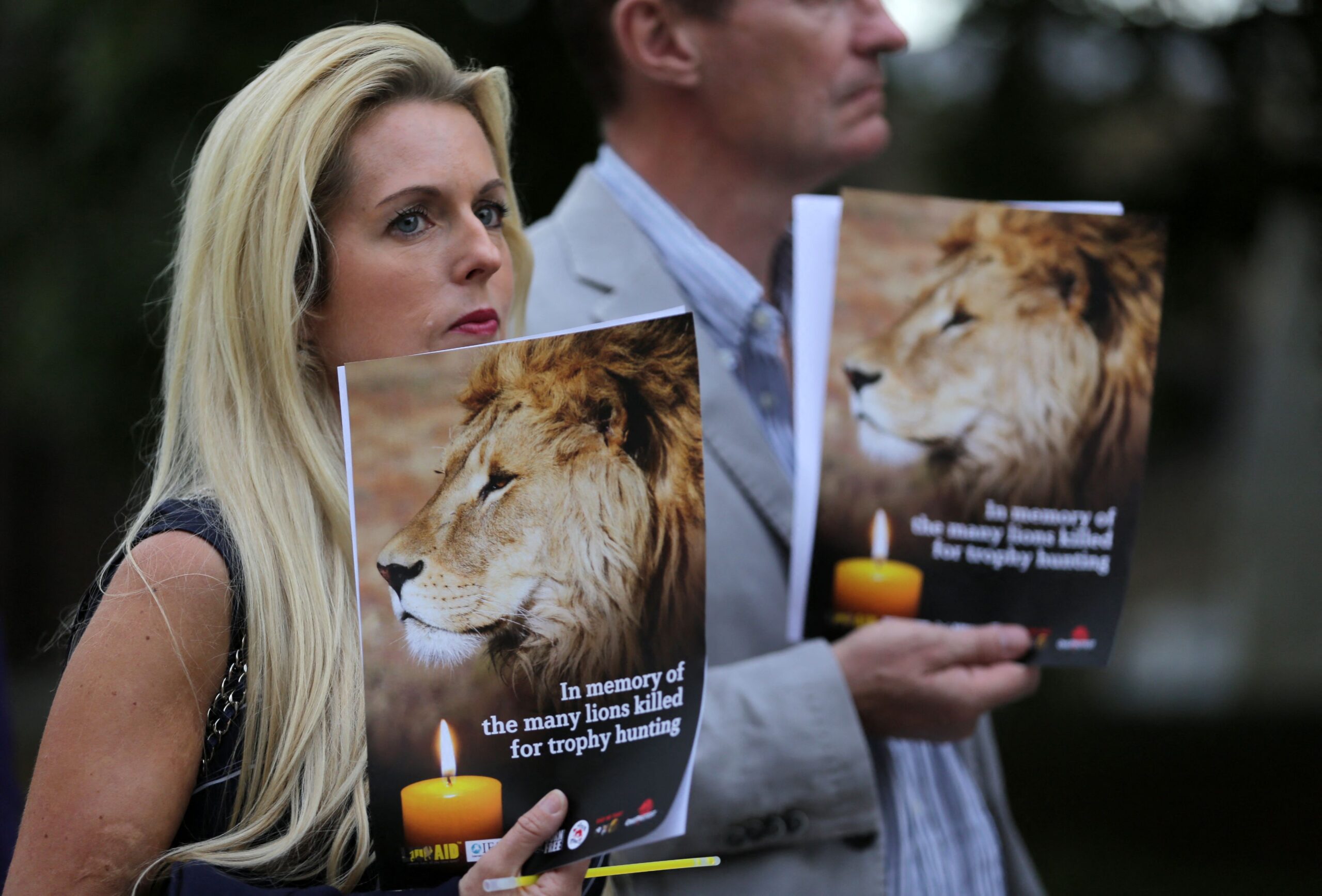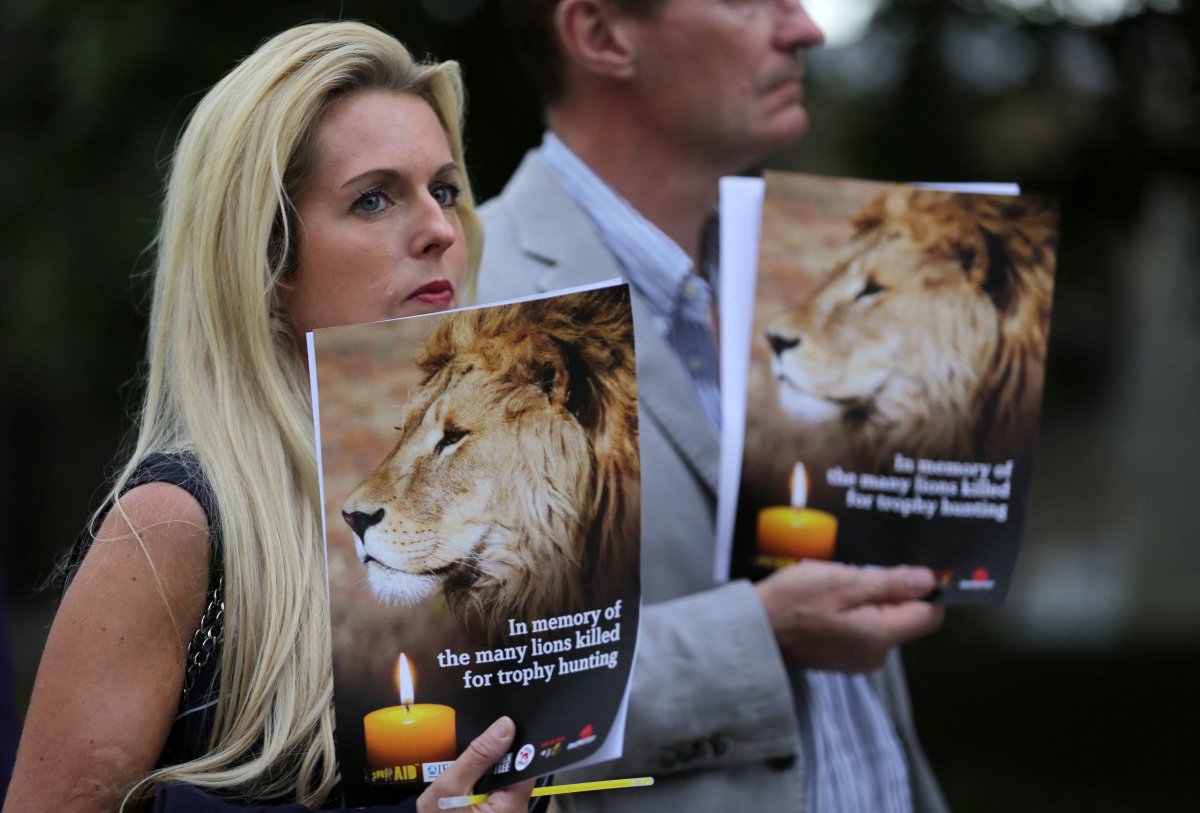
A trophy hunter killed a lion being studied by Oxford University scientists after it was apparently lured out of a Zimbabwe wildlife reserve, rekindling a bitter debate between defenders of trophy hunting and conservationists.
The five-year-old lion called Blondie was killed on the edge of the Hwange National Park in northwest Zimbabwe in late June, three months after researchers fitted it with a GPS collar, the Africa Geographic travel company, which promotes conservation, reported.
Why It Matters
The killing comes 10 years after the killing of another famous lion, Cecil, that researchers had been studying for nine years, after it was lured out of the same wildlife reserve and killed by an American trophy hunter.
Sean Herbert/AP
Lions have undergone a catastrophic range reduction of 95 percent, with only about 24,000 lions remaining, conservationists estimate, because of poaching for the illegal wildlife trade, habitat loss and human-wildlife conflict, according to the conservation group Panthera.
The killing of a relatively young male like Blondie can cause turmoil in a pride with rival males often killing off cubs as they move into the dead lion’s territory.
What To Know
Africa Geographic said on its website it had sponsored Blondie’s research collar that was fitted by University of Oxford’s Wildlife Conservation Research Unit in April.
“These GPS satellite collars are fitted to track free-roaming lions, prevent human-wildlife conflict, and support long-term conservation,” it said.
The group said it believed Blondie was baited out of a protected photographic concession area over a period of several weeks and lured into a hunting area, where it was killed.
“Despite wearing a conspicuous research collar and being younger than the recommended minimum hunting age of six years, this young lion was lured out of a photographic concession and killed in what many are calling a deeply unethical hunt,” the group said.
Simon Espley, chief executive of Africa Geographic, said he was dismayed and angered by the killing.
“That Blondie’s prominent collar did not prevent him from being offered to a hunting client, confirms the stark reality that no lion is safe from trophy hunting guns,” Espley said.
Trophy hunting is the practice of killing large game such as lions or elephants. Cecil’s death triggered global outrage over trophy hunting. It is legal in Zimbabwe for professional hunters with a license, but critics say it is poorly managed.
At the time of his death, Blondie was the dominant male of a pride that included three adult females and 10 cubs—seven cubs around one year old and three approximately one month old.
“At just over five years old, Blondie was in the prime of his life. He was not a transient male on the periphery; he was a territory-holder, and a father. His sudden loss is expected to cause turmoil for the pride, with a high likelihood that incoming rival males will kill his youngest cubs,” the African Geographic said.
Zimbabwe hunting regulations mandate a minimum age of 6 years for lions to be trophy hunted, with a focus on mature, non-pride males, it said.
The hunter involved in the killing declined to comment to Africa Geographic except to say that the hunt was “conducted legally, and ethically,” the group said.
Newsweek contacted the Zimbabwe Professional Guides Association for comment.
Defenders of trophy hunting say the millions of dollars it brings in is crucial to support underfunded conservation efforts in places like Zimbabwe.
Tinashe Farawo, the spokesperson for the Zimbabwe parks agency, defended hunting and said he had no information about Blondie being lured out of the park with bait, though adding that there “is nothing unethical or illegal about that for anyone who knows how lions are hunted. This is how people hunt,” ABC News reported.
Ten years ago, news of Cecil’s killing sparked worldwide outrage.

Daniel Leal/AFP/Getty Images
After Cecil’s killing, dozens of airlines restricted passengers from bringing wildlife trophies on flights. Also, African lions were listed in the U.S. Endangered Species Act, which prohibits the import of them altogether.
What People Are Saying
Tinashe Farawo, spokesperson for the Zimbabwe parks agency, told ABC: “Our rangers were present. All paperwork was in order. Collars are for research purposes, but they don’t make the animal immune to hunting.”
The group World Animal Protection said: “Blondie’s killing is a painful reminder that a decade after Cecil’s death, little has changed to protect these majestic animals from being exploited for sport and profit.”
